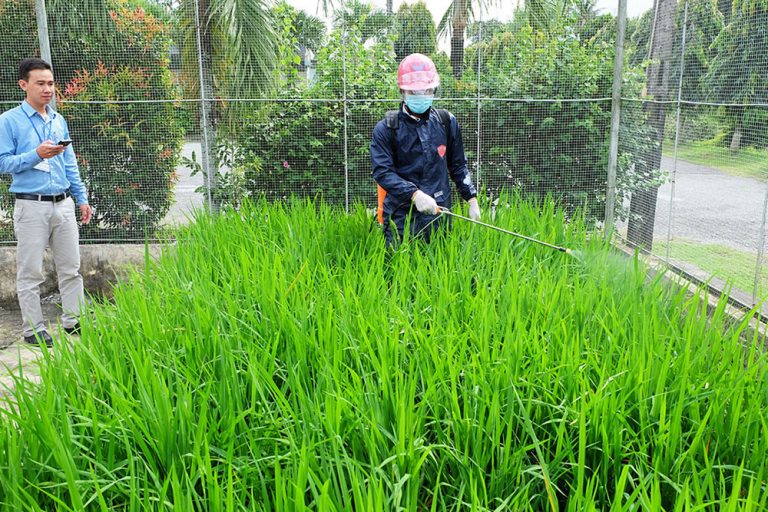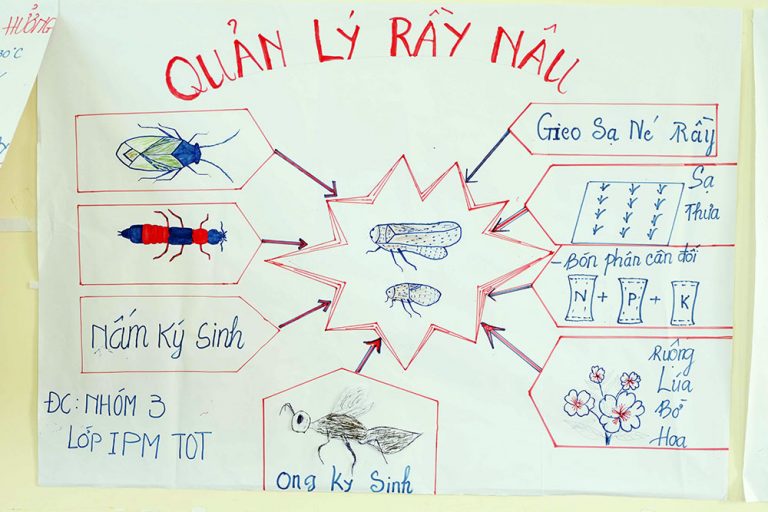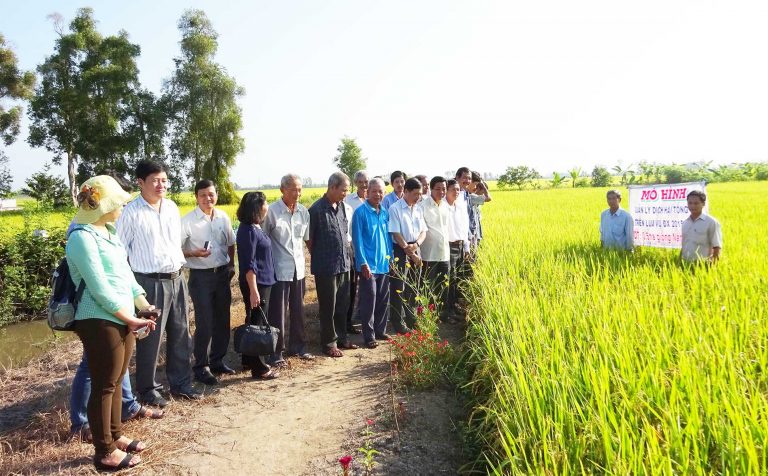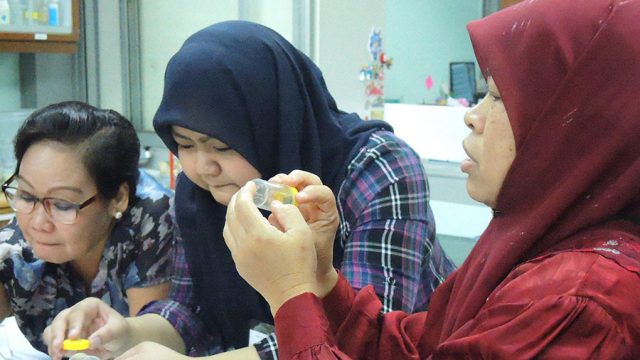Over 15,000 extension officers, rice farmers and pesticide retailers in Viet Nam are working together to overcome an inappropriate use of chemicals in Vietnam’s agricultural sector through an initiative of the Public and Private Partnership’s ‘Promotion of Integrated Pest Management to address plant hopper outbreaks in Rice’, supported by the Plant Protection Department (PPD) of the Ministry of Agriculture and Rural Development (MARD), CropLife International and the German government through ASEAN Sustainable Agrifood Systems (ASEAN SAS) project.
The aim is to strengthen knowledge and skills of government extension staff, farmers and pesticide retailers in Integrated Pest Management (IPM) to make mindful decisions for the responsible and safe use of pesticides. Between July 2015 to December 2017 over 15,000 farmers and 500 pesticide retailers in Dong Thap, Hau Giang and Kien Giang provinces in the Mekong Delta Region will have been trained in sustainable rice practices, particularly on the effective and safe use of pesticides, conducted by the PPD. The three provinces have been selected because of their vast areas under intensive rice cultivation.
Sustainability through collaboration
With an ultimate of ensuring sustainable rice cultivation in Viet Nam, the project comprises three main cooperation activities: Training of Trainers (ToT); Direct Farmer Training and Farmer to Farmer (indirect) Training; and Retailer Training.
Starting with the Master Trainers
Thirty-nine staff which nine of them are females from the local Sub Plant Protection Department in the three provinces were selected to receive the training and become Master Trainers to train groups of small-holder farmers and retailers. The Training of Trainers was conducted in October and November 2015 for the Master Trainers on IPM related knowledge, learning material development and facilitation skills through adult education training methods.
Transforming farmers to researchers and analysts
The training for farmers consists of 12 weekly modules based on various stages of rice growing from seedling, development, growing and ripening focusing on rice ecosystem analysis, farming technology, main pests and disease management, pesticide application and spraying techniques, and personal protective equipment.
The Direct Farmer Training modules (See Table 1) were developed by experts from the Southern Regional Plant Protection Center (SRPPC) and the Cuu Long Delta Rice Research Institute (CLRRI) in Viet Nam, with support from an international consultant of German International Cooperation or Deutsche Gesellschaft für Internationale Zusammenarbeit (GIZ) GmbH.
Mr. Nguyen Van Yen, rice farmer in Truong Xuan Village, ThapMuoi District, DongThap province, as one of the participants, shared what he had learnt at the end of the four-month training for farmers.
“Pesticide application must be based on rice field ecology and pest injury levels,” he said. “During the training we learned about ecological cycles and how to make the precise field decisions at every rice stage. And because of this, I can save money through reduced applications of pesticides and fungicides in my rice field.”
Mr. Van Yen said he was very happy with the rice yield and input savings at the end of this pilot season and would apply his new knowledge and skills in the IPM model in his next cropping season while also transferring it to other colleague farmers.
The first Direct Farmer Training started in November 2015 and ran through January 2016. The first group of 210 farmers was trained in the 12 weekly lessons during the rice cropping season. The aim was aimed at testing the content developed during the training of the Master Trainers. It was then followed by the training cycle of the summer growing season from April to September 2016.
In addition, for demonstration purposes, each farmer group establishes two experimental fields: one with IPM measures and the other using the farmer’s conventional plant protection measures. In Dong Yen Commune in Kien Giang Province, for example, the demo plots using the integrated pest management practice showed that the rice crops grew better while farmers saved more, thanks to the reductions in seed rate and chemical use.
Table 1: Farmer Training Modules
Training Modules
- • Introduction: Rice Eco-Systems
- • Agricultural Inputs: Responsible and Economic Use
- • Introduction to IPM and Plant Protection Measures at Seedling Stage
- • How to be an Effective Rice Doctor
- • Importance of Natural Enemies: IPM Decision-Making during Tillering Stages
- • Understanding Pesticides and their Labels: A Buyer’s Guide
- • Responsible Pesticide Use: Maximum Tillering Stage
- • Pesticide Application and Calibration
- • Decision Making during Panicle Initiation to Flowering Stages
- • Pesticide Management
- • Decision Making during Milky to Ripening Stages: Avoiding Residues
- • Pesticide Transport, Storage, Handling, First Aid and Conclusion


Making retailers as plant doctors
The Retailer Training modules were also developed by the same experts from the SRPPC and the CLRRI, supported by GIZ. In the eight-module course (See Table 2), the Master Trainers engage the retailer participants in the context of farmers’ rice production and in discussions on how to identify good advice for farmers in the responsible application of pesticides. The training is carried out in a four-day block between the end of the old and the beginning of the new rice growing season.
Mr. Ho Ngoc Liem, an agricultural retailer in Long Binh Village, Long My Town, Hau Giang Province, as one of the participants said: “The IPM training provides recent updates, new knowledge, and approaches to pesticide application in terms of different active ingredients and how they relate to insect resistance management. I will use these experiences and knowledge for my business after completing the training course.”
Ms. Nguyen Thi Thanh Thuy, Deputy Director of Hau Giang Sub Plant Protection Department, as one of the Master Trainers said: “The training helps retailers to make responsible business in pesticides and guides them to become doctors for plants.
“Retailers can give good advice to help farmers make better decisions in the rice fields. They will also gain greater benefits for their business by providing the good advice to the farmers,” she said.
Table 2: Retailer Training Modules
Training Modules
- Introduction to responsible pesticide use
- Understanding pesticide products and their labels: giving the best advice to customers
- Pesticide application, equipment and calibration
- How to be an effective crop doctor
- Issues with pesticides
- Transportation and storage of pesticides
- Maximizing the safe use of pesticides and PPE
- Better pesticide handling, first aid and conclusion
Vietnam and Pest Management
A wide range of pests affect rice cultivation in South East Asia, Viet Nam included. In recent years, outbreaks of such pests as brown and white-backed plant-hoppers caused by inappropriate agricultural practices, particularly the overuse and misuse of pesticides, have been reported. The country needs to find alternative yet environmentally friendly solutions to the current pest management scheme including the safe use of pesticides.
Promotion of Integrated Pest Management to address plant hopper outbreaks in Rice
Country: Viet Nam
Partner:
- Plant Protection Department (PPD), Ministry of Agriculture and Rural Development (MARD)
- CropLife International
- Deutsche Gesellschaft für Internationale Zusammenarbeit (GIZ) GmbH
Implemented by: ASEAN Sustainable Agrifood Systems
Contact
Dr. Matthias Bickel
Project Director, ASEAN Sustainable Agrifood Systems
M: + 66 81 938 8130
E: matthias.bickel@giz.de




